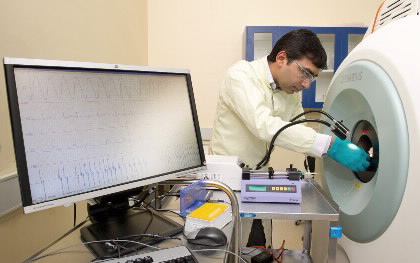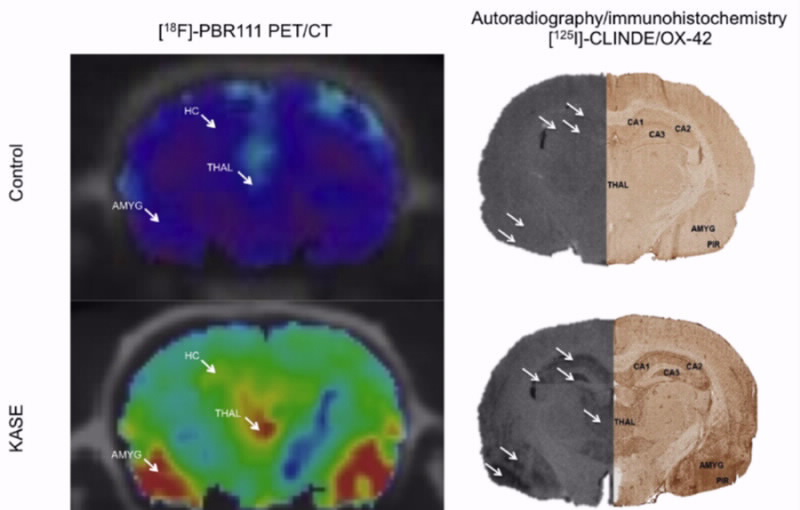 |
| ANSTO researcher using a Positron Emission Tomography tracer. |
Microfluidic technology may offer faster and more controlled ways to produce radiotracers for medical imaging, including studies into Parkinson’s disease, thanks to a first of its kind approach in the Southern Hemisphere at ANSTO.
Positron Emission Tomography (PET) is the leading molecular imaging technique capable of investigating a range of physiological functions, including drug distribution and organ molecular functioning, after the injection of a radiopharmaceutical into the body.
Due to the short half-lives of these radionuclides, there’s a growing demand for new PET tracer molecules that must be prepared rapidly and used to diagnose a range of conditions, including brain or heart conditions or cancer.
Microfluidic devices could be the key
To explain how these devices work is simple. They consist of miniature plumbing that can deal with the behaviour, control and manipulation of fluids at a microlitre scale. What they offer though in terms of outcomes could one day be to radiochemistry what smartphones have been to telecommunications, leading to PET radiotracer production being no longer a niche field, but achievable by a wider field of scientists. This in turn, will provide better biological impacts and improved health outcomes for patients.
Research has already demonstrated its benefits with 18F-altanserin, a PET radiotracer which images the serotonin receptor in the brain. It can be produced in 60-70 per cent radiochemical yield in 20 minutes under conventional (vessel-type) chemistry; microfluidic technology allows a similar yield to be produced in 47 seconds using 85 per cent less chemical mass.
 |
This technique has major potential, but is not new. The field has been around since the 1980s and used in the development of inkjet printheads, and then translated to DNA chips, lab-on-a-chip technology, micro-propulsion, and micro-thermal technologies. It was only as recent as 2004 though, when the merits of its use in PET radiochemistry were realised.
ANSTO researchers Dr Giancarlo Pascali and Dr Lidia Matesic are now studying its applications for improved research outcomes in the study of neurological diseases, including Alzheimer’s and Parkinson’s using the microfluidic NanoTek platform.
The device is a modular synthesis system and the only one of its kind in Australia, with the ability to undertake both microscale and macroscale synthesis of both PET and SPECT imaging probes using a variety of isotopes.
Dr Pascali, a world-renowned expert in microfluidic radiochemistry, is leading the study and believes the technique could be a game-changer in the field of both basic research and commercial tracer production.
“The traditional vessel-based approach suffers from limitations concerning flexibility, reagent mass needed, hardware requirements, large number of connections and valves, repetitive cleaning procedures and overall big footprint to be shielded from radiation. For these reasons, several research groups have started to investigate the application of the fast growing field of microfluidic chemistry to radiosynthetic procedures.
After the first report in 2004, many scientific papers have been published and demonstrated the potential for increased process yields, reduced reagent use, improved flexibility and general ease of setup,” he said.
The radiochemists, who are based at ANSTO’s Camperdown campus in the LifeSciences labs, are in the initial stages of their work, but are already seeing the benefits of their research.
It’s hoped in time that the research will lead to pre-clinical trials and then to human studies.
Recent work
Matesic, L. 18F-radiochemistry using the NanoTek Microfluidic Synthesis System. Australian Journal of Chemistry, In press.
L. Matesic, N.A. Wyatt, B.H. Fraser, T.Q. Pham, I. Greguric. Rapid synthesis of [18F]sulfonyl fluoride groups using microfluidics. 19th International Conference on Organic Synthesis (ICOS-19), 1st - 6th July 2012. Melbourne, Australia.
Matesic, L., Wyatt, N. A., Fraser, B. H., Roberts, M., Pham, T. Q., Greguric, I. A systematic investigation into the 18F-radiolabelling and stability of sulfonyl fluorides using microfluidics. 20th International Symposium on Radiopharmaceutical Sciences (ISRS2013), 12-17 May, 2013, Jeju International Convention Center (Jeju ICC), Jeju Island, Korea
Matesic, L. Microfluidics as an emerging technology for the synthesis of PET imaging agents 3rd Australian Cyclotron Users’ Workshop, 27 April, Melbourne (invited talk)
Matesic, L. Microfluidics at ANSTO. 20th International Symposium on Radiopharmaceutical Sciences (ISRS2013), 12-17 May, 2013, Jeju International Convention Center (Jeju ICC), Jeju Island, Korea (invited talk)
Pascali, G., Berton, A., Salvadori, P. Hardware modifications for achieving process flexibility on a microfluidic Advion system. 20th International Symposium on Radiopharmaceutical Sciences (ISRS2013), 12-17 May, 2013, Jeju International Convention Center (Jeju ICC), Jeju Island, Korea
Pascali, G. Microfluidics avenues. 20th International Symposium on Radiopharmaceutical Sciences (ISRS2013), 12-17 May, 2013, Jeju International Convention Center (Jeju ICC), Jeju Island, Korea (invited talk)
Pascali, G. Chair the automation and microfluidic session at the ISRS. 20th International Symposium on Radiopharmaceutical Sciences (ISRS2013), 12-17 May, 2013, Jeju International Convention Center (Jeju ICC), Jeju Island, Korea
Pascali, G., Watts, P., Salvadori, P. A. Microfluidics in radiopharmaceutical chemistry. Nuclear Medicine and Biology 40(6) 776–787 2013
Pascali, G., Mazzone, G., Saccomanni, G., Manera, C., Salvadori, P.A. Microfluidic approach for fast labeling optimization and dose-on-demand implementation. Nuclear Medicine and Biology 37(5), 547–555 2010
Arima, V., Pascali, G., et al. Radiochemistry on chip: towards dose-on-demand synthesis of PET radiopharmaceuticals. Lab on a Chip 12, 2328-2336 2013
Published: 03/09/2013


